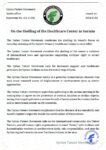Syrian Press: Reality and Solutions

The United Nations General Assembly proclaimed World Press Freedom Day in December 1993, following a recommendation from the UNESCO General Conference. Since then, the anniversary of the Windhoek Declaration has been celebrated worldwide on May 3 as World Press Freedom Day.
The history of World Press Freedom Day dates back to a UNESCO conference held in Windhoek in 1991. The conference, held on May 3, adopted the historic Windhoek Declaration for the development of a free, independent, and pluralistic press. May 3 serves as a reminder to governments of the need to respect their commitment to press freedom, assists journalists in discussing issues of press freedom and professional ethics, and evaluates the state of press freedom around the world, in addition to defending the media from attacks on its independence.
Journalism, a part of contemporary media, is directly and continuously influenced by transformations in technological, political, and cultural environments, developing within the context of technological shifts and what is termed information disruption. Contemporary journalism seamlessly blends optimal journalism standards with technology, affected by changes in technological, political, and cultural environments.
Contemporary media emerged due to the development and flourishing of traditional media forms, thus impacting all societal segments, contributing significantly to societal life with the emergence of newspapers, satellite channels, telephone networks, and websites.
Importance of Journalism:
Journalism plays a crucial role in contemporary media, highlighted by the following points:
- Journalism is a key tool for freedom of expression, granting people the right to express and represent various opinions in society.
- It holds a significant role in a democratic society, greatly influencing public opinion.
- Journalism acts as a bridge between the authorities and the people, encompassing multiple journalistic talents.
- Its primary goal is to help people recognize their rights.
- Serving the citizens is a fundamental reason for the existence of journalism.
- Journalism plays a principal role in the development of nations and peoples.
- The goals of journalism are defined not by technology, journalists, or the techniques they use, but rather by a more important matter—the role news plays in people’s lives.
Reality of Journalism in Syria:
The reality of journalism in Syria is greatly affected by the political and security conditions in the country, with reports indicating multiple violations against journalists and media personnel. In recent years, 68 cases of violations against journalists and media personnel in Syria were documented in 2021, including detentions and arrests.
Despite these challenges, journalists in Syria continue to practice their profession, requiring significant courage and a commitment to truth and journalistic integrity.
In the Syrian liberated areas, the situation of journalism is greatly influenced by the political and security conditions, facing substantial challenges including strict censorship and security threats. In recent years, numerous violations against journalists and media personnel in these areas have been documented.
Outside Syria, Syrian journalism faces considerable challenges, including strict censorship and security threats, with numerous violations documented against Syrian journalists and media personnel abroad in recent years.
Regarding the reality of contemporary digital journalism in Syria, it is significantly affected by the political and security conditions in the country. A previous study by our media office at Future Stream titled “The Media Reality Outside the Control of the Syrian Regime” detailed the reality of media in general, discussing various types of media differing in form, content, and audience.
Solutions to Problems:
Several solutions are proposed for the problems of journalism in Syria, including:
- Ensuring press freedom and protecting journalists from violations.
- Providing training and education to journalists to enhance their skills and ability to handle challenges.
- Promoting transparency and accountability in journalism, encouraging journalists to report on corruption and violations.
- Supporting independent journalism and providing support to journalists working independently.
- Offering material and moral support to journalists, including psychological support for those working under difficult conditions.
Finally, we at Future Movement call for further support for Syrian journalism, considering it a civilizational lever for the country and a means of raising awareness among the Syrian people and highlighting government policies for their exposure.
Ibrahim Mustafa
Media Office
Research and Studies Department
Articles
Syrian Future Movement (SFM)






